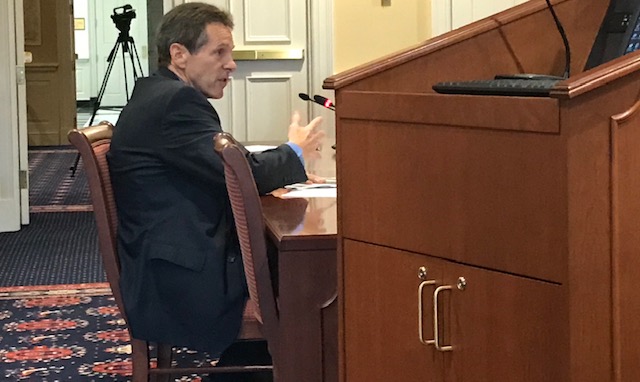@BryanRenbaum
[email protected]
The first official meeting of the Maryland Prescription Drug Affordability Board kicked off Monday with its members being given an extensive presentation about the financial disclosure requirements they must make as part of their service.
“By making public financial disclosure statements the public has an opportunity to review your financial situation as it applies to the board you serve on to determine if, in fact, you have some connections, some interests, that may give rise to some concerns about decisions you’re making,” Michael Lord, executive director of the Maryland State Ethics Commission, said in explaining the background of a key ethics reform law adopted by the General Assembly in 1979.
Lord said the five board members must disclose income derived from their personal property in the unlikely event where the value of the home or land could be affected by the board’s decisions. Lord said stock purchases must be disclosed if the investment is in a company that does business with or is regulated by the board. Lord said other required disclosures include gifts over $50 and personal income derived from work outside the board.
Lord said board members are prohibited from accepting gifts from lobbyists. He said members cannot work to advance or defeat measures they worked on while a member of the board.
Lord said disclosures can be made online or in person at the Ethics Commission’s office, which is located on Calvert Street near the State House in Annapolis. He said members must make their initial disclosure within 30 days of their appointment to the board and then again every year by April 30 if they continue to serve. A final disclosure must be made within 60 days after they leave the board, Lord said.
The presentation led to questions from the board’s members.
“So, if it’s a broad mutual fund that obviously would have some pharmaceuticals involved, but it’s the broad mutual fund, would that have to be disclosed?” Gerald Anderson, who is director of the Johns Hopkins Center for Hospital Finance and Management, asked.
Lord said mutual funds did not have to be disclosed because the law was changed several years ago to exempt their disclosure.
George Malouf Jr., who is an ophthalmologist and past president of the Maryland Eye Society, asked if pension income must be disclosed.
Lord said pensions are exempt.
“If something is held in … an IRS-type of trust, which would be a pension fund or a 401(k), those aren’t disclosable either. What you have to disclose is your individual holdings if they’re in entities that do business with your board.”
Lord said disclosure exemptions may be requested.
However, Van Mitchell, who is the chair of the board, said members voted prior to the meeting not to ask for exemptions.
“We’re not gonna file for it. We are gonna file disclosures. So I would hope that you would be lenient on the 30-day [disclosure] because we’ve all been named at different times.”
Lord said the commission is not looking to play gotcha.
“Our objective is to get filings in. Our objective is not to hit you over the head with a hammer.”
Mitchell said the board is in the process of hiring staff and is looking at Bowie as a possible office location. He said this year the board will ask the General Assembly to establish permanent funding for its administration.
The meeting was brief, lasting little more than an hour. The ethics presentation was the most extensive segment.
The legislature established the board last year. The panel will eventually have the power to set upper payment limits for high-priced prescription drugs purchased or paid for by state and local governments.
The two other board members are Johns Hopkins professor Joseph Levy and Ebere Onukwugha, who is an associate professor in the Department of Pharmaceutical Health Services Research at the University of Maryland School of Pharmacy.
The board is scheduled to hold its next meeting on Feb. 24 in the Miller Senate Office Building.




Recent Comments